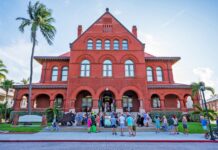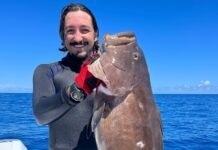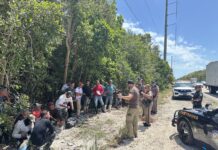
A new anti-immigration bill in Florida that took effect July 1 is affecting local restaurants and other businesses, and was opposed by the statewide Florida Restaurant & Lodging Association.
When the Key West chapter of FRLA met on Aug. 24 at Opal Key Resort & Marina, chapter leaders, including local restaurateur Bill Lay, reminded members that Senate Bill 1718 requires all private employers in Florida with 25 or more employees to use E-Verify, the federal online immigration database used to confirm whether someone is eligible to work in the U.S.’
FRLA opposed Senate Bill 1718, “and now FRLA wants to hear from you about the impacts of the new bill on your business and your employees,” Lay said. “We are working behind the scenes. We have a labor issue in Florida and we have a labor problem.”
Many employers in Florida say the new law and its requirements will only exacerbate the state’s labor shortage, as immigrant workers — including those who are here legally, but may be living with or married to those who are not — are afraid to work in Florida.
Opponents of SB 1718 point out that immigration is a federal, not a state issue.
Even the state’s Agriculture Commissioner Wilton Simpson, a Republican, acknowledged that the immigration law pushed by Gov. Ron DeSantis during his campaign for the presidency could have “unintended consequences” for the state’s construction and tourism industries.
“I do think that there are unintended consequences in our construction industry, in our hotel, restaurant lodging association,” Simpson was quoted in an Aug. 4 article in Florida Trend. “And I don’t know that we fully understand the downside to the new law. I know the intentions were good. But, again, this is a federal issue that needs to be resolved at the federal level.”
The nonprofit Florida Policy Institute estimates that without undocumented workers, some of Florida’s most labor-intensive industries — agriculture, hospitality and construction — could lose 10% of their already strapped workforce.
“That could lead to a drop of $12.6 billion in Florida’s Gross Domestic Product in a single year — about 1.1% — which would, in turn, cut workers’ spending power and reduce state and local tax revenue,” according to a May article by NPR.
“But the most worrisome measures — for businesses and undocumented immigrants alike — are the host of penalties for those who violate new employment mandates,” the NPR article states.
Florida’s Department of Economic Opportunity will be responsible for enforcing the E-Verify requirement, and DeSantis has touted new, harsh penalties for employers who violate it.
A graphic on the governor’s office website states that employers who fail to use E-Verify could be fined $1,000 a day following multiple violations. For workers, it will be a felony to use a false ID to get a job.
Critics of the law point out that the Florida Department of Economic Opportunity, which is tasked with enforcing the E-Verify requirements, “does not have a robust enforcement section and creating new positions to oversee the new provisions would result in significant costs to the state,” the Florida Policy Institute states.
Despite ongoing court challenges to some sections of the new law, it is in effect as of July 1 and the potential penalties for violations will begin in July 2024.






















